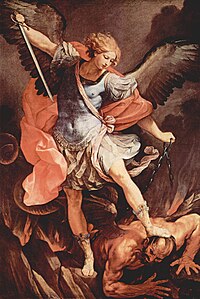
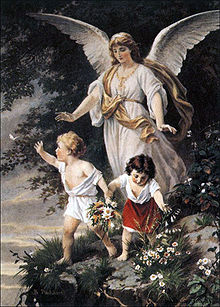



An angel is generally a supernatural being found in various religions and mythologies. In Abrahamic religions and Zoroastrianism, angels are often depicted as benevolent celestial beings who act as intermediaries between God or Heaven and Humanity. Other roles of angels include protecting and guiding human beings, and carrying out God's tasks. Within Abrahamic religions, angels are often organized into hierarchies, although such rankings may vary between sects in each religion, and are given specific names or titles, such as Gabriel or "Destroying angel". The term "angel" has also been expanded to various notions of spirits or figures found in other religious traditions. The theological study of angels is known as "angelology". Angels who were expelled from Heaven are referred to as fallen angels.
In fine art, angels are usually depicted as having the shape of human beings of extraordinary beauty; they are often identified using the symbols of bird wings, halos, and light.
Contents
Etymology
The word angel in English is a blend of Old English engel (with a hard g) and Old French angele. Both derive from Late Latin angelus "messenger", which in turn was borrowed from Late Greek ??????? aggelos, commonly transliterated by non-Greek speakers in its phonetic form ángelos. According to R. S. P. Beekes, ángelos itself may be "an Oriental loan, like ??????? ." The word's earliest form is Mycenaean a-ke-ro, attested in Linear B syllabic script.
The ángelos is the Septuagint's default translation of the Biblical Hebrew term mal’?kh, denoting simply "messenger" without specifying its nature. In the Latin Vulgate, the meaning becomes bifurcated: when mal’?kh or ángelos is supposed to denote a human messenger, words like nuntius or legatus are applied. If the word refers to some supernatural being, the word angelus appears. Such differentiation has been taken over by later vernacular translations of the Bible, early Christian and Jewish exegetes and eventually modern scholars.
Zoroastrianism
In Zoroastrianism there are different angel-like figures. For example, each person has one guardian angel, called Fravashi. They patronize human beings and other creatures, and also manifest God's energy. The Amesha Spentas have often been regarded as angels, although there is no direct reference to them conveying messages, but are rather emanations of Ahura Mazda ("Wise Lord", God); they initially appeared in an abstract fashion and then later became personalized, associated with diverse aspects of the divine creation.
Neoplatonism
In the commentaries of Proclus (4th century, under Christian rule) on the Timaeus of Plato, Proclus uses the terminology of "angelic" (aggelikos) and "angel" (aggelos) in relation to metaphysical beings. According to Aristotle, just as there is a Prime Mover, so, too, must there be spiritual secondary movers.
Abrahamic religions
Judaism
The Torah uses the (Hebrew) terms ???? ????? (mal'?k? '?l?hîm; messenger of God), ???? ???? (mal'?k? YHWH; messenger of the Lord), ??? ????? (b?n? '?l?hîm; sons of God) and ??????? (haqqôd??šîm; the holy ones) to refer to beings traditionally interpreted as angels. Later texts use other terms, such as ???????? (h?'elyônîm; the upper ones).
The term ???? (mal'?k?) is also used in other books of the Tanakh. Depending on the context, the Hebrew word may refer to a human messenger or to a supernatural messenger. A human messenger might be a prophet or priest, such as Malachi, "my messenger"; the Greek superscription in the Septuagint translation states the Book of Malachi was written "by the hand of his messenger" ??????? angélu. Examples of a supernatural messenger are the "Malak YHWH," who is either a messenger from God, an aspect of God (such as the Logos), or God himself as the messenger (the "theophanic angel.")
Scholar Michael D. Coogan notes that it is only in the late books that the terms "come to mean the benevolent semi-divine beings familiar from later mythology and art." Daniel is the first biblical figure to refer to individual angels by name, mentioning Gabriel (God's primary messenger) in Daniel 9:21 and Michael (the holy fighter) in Daniel 10:13. These angels are part of Daniel's apocalyptic visions and are an important part of all apocalyptic literature.
In Daniel 7, Daniel receives a dream-vision from God. As Daniel watches, the Ancient of Days takes his seat on the throne of heaven and sits in judgement in the midst of the heavenly court an like a son of man approaches the Ancient One in the clouds of heaven and is given everlasting kingship.
Coogan explains the development of this concept of angels: "In the postexilic period, with the development of explicit monotheism, these divine beings—the 'sons of God' who were members of the Divine Council—were in effect demoted to what are now known as 'angels', understood as beings created by God, but immortal and thus superior to humans." This conception of angels is best understood in contrast to demons and is often thought to be "influenced by the ancient Persian religious tradition of Zoroastrianism, which viewed the world as a battleground between forces of good and forces of evil, between light and darkness." One of these is h?š???n, a figure depicted in (among other places) the Book of Job.
Philo of Alexandria identifies the angel with the Logos inasmuch as the angel is the immaterial voice of God. The angel is something different from God himself, but is conceived as God's instrument.
In post-Biblical Judaism, certain angels took on particular significance and developed unique personalities and roles. Although these archangels were believed to rank among the heavenly host, no systematic hierarchy ever developed. Metatron is considered one of the highest of the angels in Merkabah and Kabbalist mysticism and often serves as a scribe; he is briefly mentioned in the Talmud and figures prominently in Merkabah mystical texts. Michael, who serves as a warrior and advocate for Israel (Daniel 10:13), is looked upon particularly fondly. Gabriel is mentioned in the Book of Daniel (Daniel 8:15–17) and briefly in the Talmud, as well as in many Merkabah mystical texts. There is no evidence in Judaism for the worship of angels, but there is evidence for the invocation and sometimes even conjuration of angels.
According to Kabbalah, there are four worlds and our world is the last world: the world of action (Assiyah). Angels exist in the worlds above as a 'task' of God. They are an extension of God to produce effects in this world. After an angel has completed its task, it ceases to exist. The angel is in effect the task. This is derived from the book of Genesis when Abraham meets with three angels and Lot meets with two. The task of one of the angels was to inform Abraham of his coming child. The other two were to save Lot and to destroy Sodom and Gomorrah.
Jewish philosopher Maimonides explained his view of angels in his Guide for the Perplexed II:4 and II
... This leads Aristotle in turn to the demonstrated fact that God, glory and majesty to Him, does not do things by direct contact. God burns things by means of fire; fire is moved by the motion of the sphere; the sphere is moved by means of a disembodied intellect, these intellects being the 'angels which are near to Him', through whose mediation the spheres move ... thus totally disembodied minds exist which emanate from God and are the intermediaries between God and all the bodies here in this world.
—?Guide for the Perplexed II:4, Maimonides
Maimonides had a neo-Aristotelian interpretation of the Bible. Maimonides writes that to the wise man, one sees that what the Bible and Talmud refer to as "angels" are actually allusions to the various laws of nature; they are the principles by which the physical universe operates.
For all forces are angels! How blind, how perniciously blind are the naive?! If you told someone who purports to be a sage of Israel that the Deity sends an angel who enters a woman's womb and there forms an embryo, he would think this a miracle and accept it as a mark of the majesty and power of the Deity, despite the fact that he believes an angel to be a body of fire one third the size of the entire world. All this, he thinks, is possible for God. But if you tell him that God placed in the sperm the power of forming and demarcating these organs, and that this is the angel, or that all forms are produced by the Active Intellect; that here is the angel, the "vice-regent of the world" constantly mentioned by the sages, then he will recoil.– Guide for the Perplexed II:4
Jewish angelic hierarchy

Request Movie Now
Watch movie Angel online on Amazon
Watch movie Angel online
Watch The Movie On PrimeDance Dance Full HD Movie Download

Chirag Full HD Movie Download

Coolie Full HD Movie Download
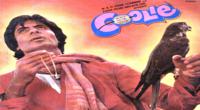
Aafat Full HD Movie Download

Justice Chowdary Full HD Movie Download

Laat Saab Full HD Movie Download

Hum Dono (1995) Full HD Movie Download
.jpg)
Mera Pind My Home Full HD Movie Download

7 Khoon Maaf Full HD Movie Download

Veerabaahu Full HD Movie Download

Anantha Poonkatre Full HD Movie Download

Aatma Gowaravam Full HD Movie Download
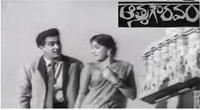
Keelu Gurram Full HD Movie Download

Veta Full HD Movie Download

Nelavanka Full HD Movie Download

Nagastram Full HD Movie Download

Oka Chinna Maata Full HD Movie Download

Police Ante Veederaa Full HD Movie Download

Palleturi Pidugu Full HD Movie Download

Bangaru Panjaram Full HD Movie Download
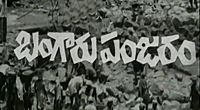
S.P.Shankar Full HD Movie Download

Download latest Movie from bollywood
- 1> baaghi 3
- 2> THE SKY IS PINK MOVIE FULL STORY AND REVIEW
- 3> Luka Chuppi
- 4> TO ALL THE BOYS I’VE LOVED BEFORE
- 5> Kabir Singh
- 6> Street Dancer 3D
- 7> Simmba
- 8> Gone Girl
- 9> The Girl Who Lived
- 10> Ludo
- 11> DILWALE DULHANIA LE JAYENGE
- 12> GUILTY
- 13> The Godfather
- 14> Adventures of Rusty
- 15> Sooryavanshi
- 16> Satyameva Jayate 2
- 17> Thappad
- 18> Bhool Bhulaiyaa 2
- 19> KGFChapter 2
- 20> Mardaani 2
- 21> Pinjar
- 22> Shivaji maharaj
- 23> Ek Villian 2
- 24> Hungama 2
- 25> Divergent
- 26> Mumbai Saga
- 27> The Internship
- 28> HIT (telugu)
- 29> Panga
- 30> The perfect date
- 31> 16 December
- 32> Gopala Gopala (Telugu)
- 33> Brahmastra
- 34> Gangubai Kathiawadi
- 35> Manmadhudu
- 36> Nenu local
- 37> Mahanati
- 38> Shatamanam bavathi
- 39> Lagaan
- 40> After
- 41> MOM
- 42> Shamshera
- 43> Raguvaran BTech
- 44> Khakee
- 45> The villain
- 46> OM
- 47> Mr. perfect
- 48> Bueatifull mind
- 49> Hichki
- 50> Gabbar Singh
- 51> Jogi
- 52> Before Sunrise
- 53> Before Sunset
- 54> Before Midnight
- 55> The Big Bull
- 56> Top Gun: Maverick
- 57> The Purge
- 58> The Sky is Pink
- 59> Laxmmi Bomb
- 60> Sadak 2
- 61> Sufna
- 62> Prithviraj
- 63> PK
- 64> Coolie No 1(2020)
- 65> Black Widow
- 66> Dear Zindagi
- 67> Dil Bechara
- 68> PHIR HERA PHERI
- 69> WAR
- 70> Dostana
- 71> RRR: Roudram Ranam Rudhiram
- 72> Maidan
- 73> Dabbang 3
- 74> Chhalaang
- 75> life as we know it
- 76> SherShaah
- 77> Sandeep Aur Pinky Faraar
- 78> Event Horizon
- 79> 83
- 80> Radhe: Your Most Wanted Bhai
- 81> Gunjan Saxena: The Kargil Girl
- 82> Mr India
- 83> Vivah
- 84> Anokha Bandhan
- 85> Ghost
- 86> Bhoot: Part One - The Haunted Ship
- 87> Haseen Dilruba
- 88> Laal Singh Chaddha
- 89> Qismat
- 90> Rajput
- 91> Drive
- 92> Dil Chahta Hai
- 93> Dil Ki Baazi
- 94> Dil Ka Rishta
- 95> Teesri Manzil
- 96> Dil
- 97> Love Aaj Kal
- 98> Khaali Peeli
- 99> Bunty Aur Babli 2
- 100> Atrangi Re
- 101> Gulabo Sitabo
- 102> Jodi
- 103> Suraj Pe Mangal Bhari
- 104> Deewana
- 105> Attack
- 106> Sardar Udham Singh
- 107> Toofan
- 108> THE LOVEBIRDS
- 109> Jersey
- 110> Ginny Weds Sunny
- 111> Thalaivi
- 112> Shiddat
- 113> Angels vs Zombies
- 114> Koi Mil Gya
- 115> Thank God
- 116> Bhuj: The Pride of India
- 117> Hum Aapke Hain Kaun
- 118> The Platform
- 119> Bird Box
- 120> Roohi Afzana
- 121> Torbaaz
- 122> Nikamma
- 123> World War Z
- 124> Extraction
- 125> Train to Busan
- 126> Life of Pi
- 127> SHAADI MEIN JROOR AANA
- 128> Himmat Aur Mehnat
- 129> To All The Boys: P.S. I Still Love You
- 130> Mimi
- 131> Good Newwz
- 132> Shubh Mangal Zyada Saavdhan
- 133> Raabta
- 134> Harry Potter and the Philosopher's Stone
- 135> Harry Potter and the Chamber of Secrets
- 136> Chhapaak
- 137> War of the Worlds
- 138> Harry Potter and the Prisoner of Azkaban
- 139> Harry Potter and the Goblet of Fire
- 140> MURDER MYSTERY
- 141> Shakuntala Devi
- 142> Bachchan Pandey
- 143> Jayeshbhai Jordar
- 144> Sheer Qorma
- 145> Saina
- 146> 'O' Pushpa I hate tears
- 147> Kedarnath
- 148> MS Dhoni The Untold Story
- 149> Chhichhore
- 150> Badhaai Ho
- 151> Unstoppable
- 152> Oz the Great And Powerful
- 153> The Girl on the Train
- 154> Haathi Mere Saathi 2020
- 155> The Conjuring: The Devil Made Me Do It
- 156> Gandhi Se Pehle Gandhi
- 157> The Song of Scorpions
- 158> Srimanthudu
- 159> Hello Guru Prema Kosame
- 160> Beauty and The Beast
- 161> Black Panther
- 162> Charlie and the Chocolate Factory
- 163> Bole Chudiyan
- 164> Fidaa
- 165> Duvvada Jagannadham
- 166> Bruce Lee: The Fighter
- 167> Hyper
- 168> Yaara
- 169> Red (2020)
- 170> Shivam
- 171> That Is Mahalakshmi
- 172> Nishabdham
- 173> Aashram 2020 web series
- 174> Laxmii
- 175> Mismatched
- 176> STUDENT OF THE YEAR 2
- 177> NAIL POLISH
- 178> Ramprasad Ki Tehrvi
- 179> KAAGAZ
- 180> 12 o Clock
- 181> The Power
- 182> bolo hau
- 183> Tribhanga
- 184> JAMUN
- 185> Madam Chief Minister
- 186> Maasaab
- 187> Aadhaar
- 188> Tanhaji
- 189> Bhaagi 3
- 190> Bhootnath
- 191> MALANG
- 192> Jai Mummy Di
- 193> Haathi Mere Saathi 2021
- 194> Shakeela
- 195> Unpaused
- 196> Annayya
- 197> Vamsoddharakudu
- 198> Mrugaraju
- 199> Narasimha Naidu
- 200> Sankranti
- 201> Manasu Maata Vinadhu
- 202> Anjaane
- 203> Apaharan
- 204> Bachke Rehna Re Baba
- 205> Bewafaa
- 206> Roohi
- 207> Radhe
- 208> Zindagi Khoobsoorat Hai
- 209> Yeh Mohabbat Hai
- 210> Yeh Kya Ho Raha Hai?
- 211> The Tomorrow War
- 212> DehradunDiary
- 213> Meri Shaadi Karaoo
- 214> Matruu Ki Bijlee Ka Mandola
- 215> No One Killed Jesica
- 216> Aag Ka Goola
- 217> Eight Million Dollars
- 218> Three Hundred
- 219> Cats and Dog
- 220> Decoy
- 221> Gold Rush
- 222> You Have Got Mail
- 223> Final Destination three
- 224> Tofan
- 225> Jungle
Request for Download movie Angel
- Bollywood movies
- Latest Bollywood movies
- Download all bengali movies
- Download all bhojpuri movies
- Download all english movies
- Download all gujarati movies
- Download all hindi movies
- Download all kannada movies
- Download all malayalam movies
- Download all marathi movies
- Download all oriya movies
- Download all punjabi movies
- Download all tamil movies
- Download all telugu movies
- Bollywood action movies
- Bollywood adventure movies
- Bollywood animation movies
- Bollywood classical movies
- Bollywood comedy movies
- Bollywood crime movies
- Bollywood devotional movies
- Bollywood documentary movies
- Bollywood drama movies
- Bollywood family movies
- Bollywood fantasy movies
- Bollywood historical movies
- Bollywood history movies
- Bollywood horror movies
- Bollywood musical movies
- Bollywood mystery movies
- Bollywood mythological movies
- Bollywood patriotic movies
- Bollywood romance movies
- Bollywood romantic movies
- Bollywood sci-fi movies
- Bollywood social movies
- Bollywood spiritual movies
- Bollywood sports movies
- Bollywood suspense movies
- Bollywood thriller movies
- Bollywood war movies
- Hot actress list
- Hot gujarati actress list
- Hot tamil actress list
- Hot bhojpuri actress list
- Hot assam actress list
- Hot bihari actress list
- Hot jammu and kashmir actress list
- Hot gujarati actress list
- Hot haryana actress list
- Hot konkani actress list
- Hot marathi actress list
- Hot odia actress list
- Hot punjabi actress list
- Hot rajasthani actress list
- Hot kannada actress list
- Hot malayalam actress list
- Hot telugu actress list
- Hot tulu actress list
- Hot Actress list from Indian city
- Hot actress list from ahmedabad
- Hot actress list from alappuzha
- Hot actress list from bangalore
- Hot actress list from bangalore
- Hot actress list from bhopal
- Hot actress list from chandigarh
- Hot actress list from chennai
- Hot actress list from guwahati
- Hot actress list from hyderabad, india
- Hot actress list from indore
- Hot actress list from jaipur
- Hot actress list from kannur
- Hot actress list from kochi
- Hot actress list from kolkata
- Hot actress list from kollam
- Hot actress list from kottayam
- Hot actress list from kozhikode
- Hot actress list from lucknow
- Hot actress list from madurai
- Hot actress list from mangalore
- Hot actress list from mumbai
- Hot actress list from mysore
- Hot actress list from new delhi
- Hot actress list from patna
- Hot actress list from pune
- Hot actress list from thiruvananthapuram
- Hot actress list from thrissur
- Hot actress list from tiruchirappalli
- Hot actress list from vijayawada
- Hot actress list from visakhapatnam
- All Bollywood Movies
- Bollywood Celeb
- >Art Director
- >Audiography
- >Background Music
- >Banner
- >Choreographer
- >Cinematographer
- >Costume Designer
- >Dialogue Writer
- >Director
- >Distributor
- >Editor
- >Executive Producer
- >Hair Stylist
- >Lyricist
- >Music Director
- >Photographer
- >Playback Singers
- >Presenter
- >Producer
- >Production Company
- >Production Designer
- >Screenplay
- >Singer
- >Sound
- >Actor
- >Story Writer
- >Studio
- >Video Director
- >Miscellaneous
- >Publicity (pro)
- >Web Creator
- >Production Labs
- >Publicity Design
- >Publicity Stills
- >Writer
- >Miscellaneous Artists
- >Visual Effects
- >Reporter
- >Music Company
- >Shooting Studios
- >Picturised On
- >Line Producer
- >Co Producer
- >Asst Director
- >Casting Director
- >Cinematography
- >Choreography
- >Dialouge
- >Editing
- >Lyrics
- >Music
- >Story
- >Playback Singer Female
- >Playback Singer Male
- >Actor In A Comic Role (male/female)
- >Child Artiste
- >Ensemble Cast
- >Actor Popular Choice (male)
- >Actor Popular Choice (female)
- >Sa Re Ga Ma Pa Song Of The Year
- >Actor In Supporting Role
- >Actress In Supporting Role
- >Actor In Leading Role
- >Art Direction
- >Actress In Leading Role
- >Sound Recording
- >Costume Design
- >Special Effects
- >Action
- >Actor In A Negative Role
- >Lifetime Achievement Award
- >Cinematic Exellence (director)
- >Cinematic Exellence (male)
- >Cinematic Exellence (female)
- >International Male Icon
- >International Female Icon
- >Actor In A Supporting Role (male)
- >Actor In A Supporting Role (female)
- >Actor In A Comic Role
- >Playback Singer (male)
- >Playback Singer (female)
- >Most Promising Debut (female)
- >Most Promising Debut (male)
- >Most Promising Director
- >Sound Design
- >Lifetime Jodi
- >Marketed Film
- >Jury Award For Best Actor
- >Jury Award For Best Actress
- >Jury Award For Best Film
- >Jury Award For Best Director
- >Playback Singer(male)
- >Lifetime Acheivement Award (male)
- >Excellence Award
- >Jodi Award
- >Performer Of The Year
- >Presented By